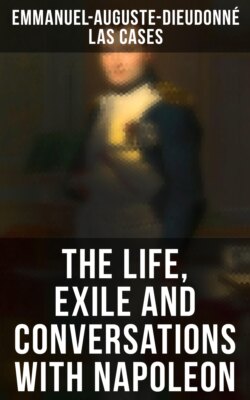Читать книгу The Life, Exile and Conversations with Napoleon - Emmanuel-Auguste-Dieudonné Las Cases - Страница 95
На сайте Литреса книга снята с продажи.
THE EMPEROR SPEAKS IN PRAISE OF ST. HELENA.—SCANTY
RESOURCES OF THE ISLAND.
ОглавлениеTable of Contents
February 1.—The happiest and wisest philosophy is that which sometimes enables us to view the least unfavourable side of the most disagreeable things. The Emperor, who was, doubtless at the moment, under the influence of this happy feeling, observed, as we were walking with him in the garden, that, after all, as a place of exile, perhaps St. Helena was the best that could be. In high latitudes we should have suffered greatly from cold, and, in other tropical islands, we should have dragged out a miserable existence under the scorching rays of the sun. “This rock,” continued he, “is wild and barren, no doubt; the climate is monotonous and unwholesome; but the temperature, it must be confessed, is mild and agreeable.”
He afterwards asked me, in the course of conversation, which would have been preferable, England or America, in case we had been free to follow our own inclinations. I replied that, had the Emperor wished to spend his days in philosophic retirement, far from the tumult of the world, he should have chosen America; but, if he felt any interest, or entertained any after-thought with regard to public affairs, he should have preferred England. And, not willing to be behindhand in giving an additional touch to the flattering picture which the Emperor had drawn of our miserable rock, I even ventured to say that there might, perhaps, be circumstances under which St. Helena would not be found the worst possible asylum. We might here be under shelter, while the tempest was howling in other parts of the world; and we were placed beyond the reach of conflicting passions, circumstances every way favourable to the chance of a happier futurity. These observations arose out of my wish to represent things on their fairest side; I extended the horizon to the utmost stretch of my imagination.
Meanwhile, in order to afford a correct idea of our place of exile and the scantiness of its resources, it is only necessary to observe that we were this day informed it would be requisite to economise various articles of our daily consumption, and, perhaps, even to make a temporary sacrifice of some. We were told that the store of coffee was rapidly diminishing, and that it might soon be entirely exhausted. For a considerable time we have denied ourselves the use of white sugar; there was but very little and that very bad, which was reserved exclusively for the Emperor’s use; and there is now every prospect of this little supply being exhausted before more can be obtained. It is the same with various other necessaries. Our island is like a ship at sea; our stores are speedily exhausted, if the voyage be prolonged, or if we have more mouths to feed than we have the means of supplying. Our arrival has produced a scarcity at St. Helena, particularly as trading ships are not now suffered to approach the island; we might be tempted to believe that they avoid it as a fatal rock, were we not aware that the English cruiser carefully keeps them at bay. But, of all the privations with which we are threatened, that which most surprises us, and which is most of all vexatious, is the want of writing paper. We are informed that, during our three months residence here, we have consumed all the paper in the island; which proves either that St. Helena is in general very scantily supplied with that article, or that we have used a most unreasonable quantity. The inmates of Longwood must have consumed six or eight times as much as all the rest of the colony together.
In addition to this, our physical and moral privations must be taken into account; it must be recollected that we are not in the full enjoyment of even the few resources which the island affords, and of which arbitrary feeling and caprice in part deprive us; for we are not permitted to regale our eyes with the sight of the grass and foliage, in places at a certain distance from Longwood. The Admiral had promised that the Emperor should be free to ride over the whole of the island, and that he would make arrangements with respect to his guard, so as to relieve him from all annoyance. It has already been seen how, on our second attempt to avail ourselves of it, the Admiral broke this kind of engagement; and by his orders an officer insisted on accompanying the Emperor in his rides. The Emperor consequently renounced the idea of taking any excursion whatever, and we now remain cut off from all communication with mankind.
With respect to our physical existence, our situation is most miserable, either through unavoidable circumstances or mismanagement. Scarcely any of the provisions are eatable. The wine is execrable; the oil unfit for use; the coffee and sugar almost exhausted, and, as I have already observed, we have nearly bred a famine in the island. Of course, we can endure all these privations, and might contrive to exist under many more. But, when it is asserted that we are treated in a style of magnificence, when it is declared that we are very well off, we are induced to unfold our real situation, and to shew that we are destitute of every comfort. And, lest our silence hereafter should lead to the inference that we are happy, let it be understood that our moral strength may enable us to endure miseries which language would be inadequate to express.
